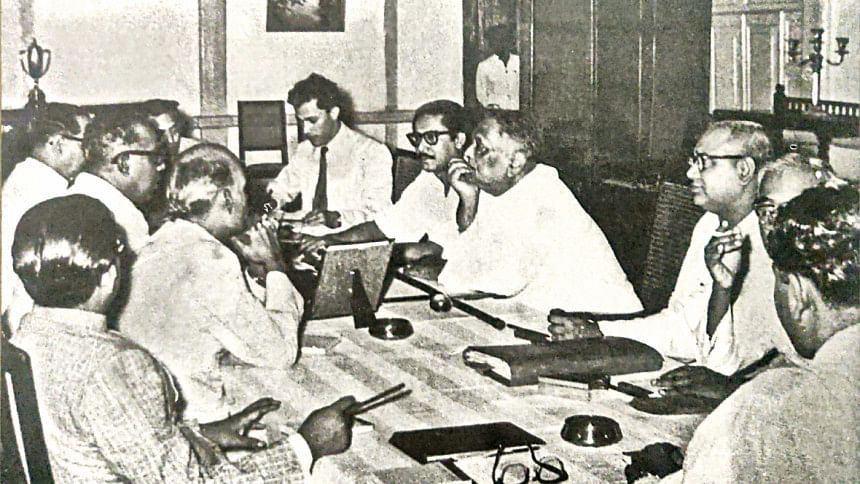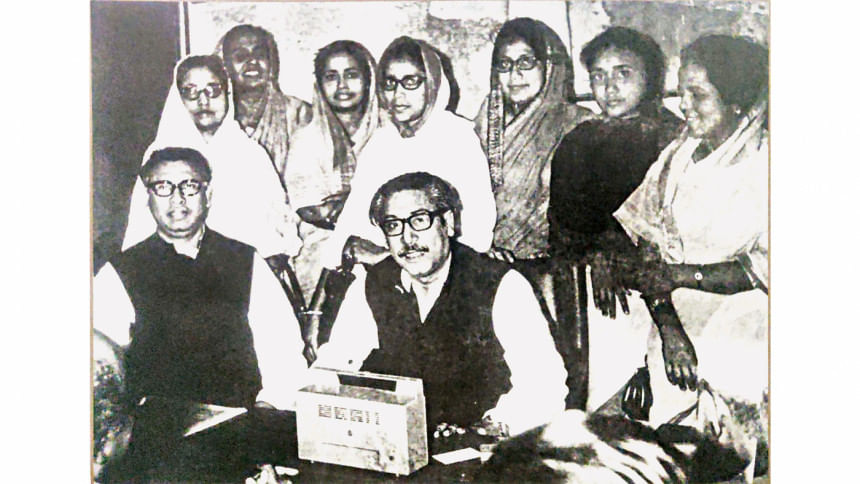Remembering Sheikh Mujib- A Young and Dynamic Minister

With the fall of United Front Government of Abu Hossain Sarkar in 1956, Ataur Rahman Khan formed the Awami League Government in East Pakistan and Sheikh Mujib, Captain Monsur Ali, Manoranjan Dhar and few other prominent Awami League leaders joined the Cabinet of Ataur Rahman Khan. Sheikh Mujib was given the portfolio of Commerce. Labour and Industries, popularly known as the Department of C L & I which also looked after power and electricity, there being no separate department for power or electricity in the then East Pakistan Government.
I was then working as Under Secretary, Department of Finance, having joined there a year earlier. I had known Sheikh Mujib as a fire-brand politician who spent years in jail for his views as an opposition activist, but had no personal acquaintance with him.
During that period, Dhaka Electric Supply Company was in private hands and was managed by Messrs Octavious Steel, a British Company with their main office in Chittagong and the commercial office of Dhaka Electric Supply located on Abdul Gani Road adjacent to the East Pakistan Secretariat. I got the first taste of Sheikh Mujib's bold decision-making style when one day, while traveling to the Secretariat in a rickshaw, I noticed a contingent of armed constables surrounding the commercial office of Dhaka Electric Supply and on reaching office learnt that Sheikh Mujib, in one sweep, has taken over management of the Dhaka Electric Supply from Messrs Octavious Steel on allegations of grave mismanagement and that I have been entrusted with the responsibility of making detailed investigation into the charges of mismanagement and corruption. It dawned on me that it was not for nothing that Sheikh Mujib had earned the reputation as a fire-brand politician who clearly knew his priorities. I was more than convinced that more such surprises are in the offing.

A few days after this episode, I was promoted as Additional Deputy Commissioner and was posted to Rangpur where I spent only six months and again was posted back to the Secretariat as Financial Adviser (Development) and Deputy Secretary, Department of Finance, a key position created by the Government to bring sanctioning of all development expenditure under one officer in the Dept. of Finance. In this capacity. I was also responsible to handle all loan negotiations with the Government of Pakistan including release of developmental funds from the center to the provincial government.
Loan negotiation with the Ministry of Finance, Government of Pakistan, was an uphill task and obtaining release of funds was a nightmare. It was a frustrating experience for a young officer like me to take the long journey to Karachi almost every month and return most of the time empty handed.
One morning, as I was looking into urgent message from the Government of Pakistan, I got the surprise of my life with the contents of a sanctioning letter which said that the Ministry of Finance was pleased to sanction Rs. 1 crore for a Film Development Corporation and another Rs. 1 crore for creating of corporation for the development of small-scale industry in East Pakistan.
It was quite clear that some unseen hands had worked behind the scene to obtain overnight sanction and simultaneous release of funds for two corporate bodies about which neither the Planning Department nor the Dept. of Finance were aware of. To me it was a miracle and I knew that none other than Sheikh Mujib was capable of performing such miracles.
The film industry in East Pakistan during that period was non-existent, One or two bold producers have tried in vain with Bengali production but with little or no success. Sheikh Mujib realized that for production of good Bengali films, the industry needed government patronage and support, needed production facilities and well-equipped studios etc. without which the field would remain wide open for Urdu films from West Pakistan.
An autonomous type corporate body for the development of small-scale industry was a novel idea in those days.
After Sheikh Mujib made a beginning with this successful experiment in East Pakistan, West Pakistan followed suit and created the West Pakistan Small Industries Corporation.
Today, perhaps not many people are aware of Sheikh Mujib's contribution to the development of film industry in East Pakistan.
In September 1957, I left for Harvard University for higher studies and developed close friendship with Prof. Munier Chowdhury who was studying linguistics at the same university. He lived in a small flat with his wife Lily Chowdhury and son Bhason. Prof. Chowdhury informed me that Sheikh Mujib, who had, by this time left the Government and took over as the Secretary General of the Awami League party was coming to Boston for medical treatment. We both went to the Boston Logan Airport and received Sheikh Mujib who had come there for a major stomach surgery at the Boston General Hospital.
Sheikh Mujib was all alone in a foreign country for undergoing a major surgery and therefore we decided that, between me and Prof. Chowdhury, we should take time, in between studies, to be by his hospital bed-side as much as possible. After about a week, Sheikh Mujib was released from the hospital and moved into Munier Chowdhury's one bed-room apartment and occupied a corner of the 10 ft. by 12 ft. living room. He could not afford the cost of recuperating in a hotel. It was during this period that I came very close to him and many a time he and Munier Chowdhury would reminiscence about their life in the Dhaka Central Jail. Lily Chowdhury was an excellent hostess.
The Harvard Group, with Dean Mason, David Bell, Gustav Papanek etc. were keen to meet Sheikh Mujib and it fell on me to arrange the meeting. Sheikh Mujib was greatly impressed by the interest and in-depth knowledge that this group had about Pakistan's politics and economy. It was this Harvard Group that came out openly to condemn the genocide perpetrated by the Pakistani Army after the crackdown in 1971.
It was evident that Sheikh Mujib was on a tight budget but it did not deter him to shower an expensive gift on Munier Chowdhury's son at the time he left Harvard. Even with a limited pocket, Mujib carried with him a large heart.
The love and affection that developed between me and Sheikh Mujib during those Harvard days came to an end when the cruel hands of destiny abruptly removed the great man from our midst.
M Matiul Islam is a former Finance Secretary.
This article was first published in The Daily Star on March 17, 1998.

 For all latest news, follow The Daily Star's Google News channel.
For all latest news, follow The Daily Star's Google News channel. 








Comments